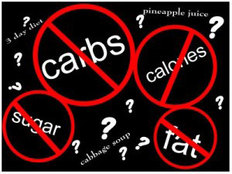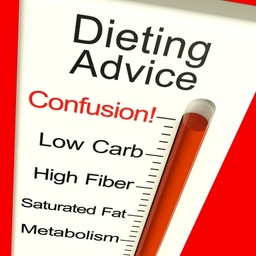|
As the prevalence of obesity and overweight peaks nationally and worldwide, the need for effective dietary treatments has become a primary public health concern. There’s a question we hear almost daily as a dietitian and personal trainer: “Why can’t I lose weight when I’m working out every day?”. Exercise is important, but won’t be the magic solution. The truth is, you cannot out train a crappy diet! Research shows that diet controls approximately 75-80% of weight loss. Not to say that exercise is any less of a factor as it helps build metabolism and develop lean muscle mass for long-term weight management. Diet can also be one of the most confusing parts of the puzzle with some much information available online. To address these weight issues, a number of diets that manipulate our basic macronutrients (carbohydrate, fat, protein) have increased in popularity as a means to promote weight loss. Three predominant diets, each with a different macronutrient composition, have been commonly used for weight loss in overweight and obese populations. Among these diets are low-fat (fat-restricted), low-carbohydrate (carbohydrate-restricted) and high-protein diets. Many old school, conventional dietary approaches have focused on the use of low-fat and energy deficit diets to induce and maintain weight loss. These low-fat diets have primarily focused on reducing total dietary fat intake to less than 30% of calories consumed. However, in recent years, the use of many low-carbohydrate diets for rapid weight loss have become the focus increasingly. While several studies have demonstrated the effectiveness of low-carbohydrate diets on short-term weight, numerous professional organizations have expressed concerns about various adverse health outcomes associated with these diets. In addition, findings from studies assessing the long-term efficacy of low-carbohydrate diets have been inconsistent, lacking evidence to support long term weight management which is ultimately the primary goal. Recent research attention has been focused on the use of high-protein diets to promote weight loss in overweight and obese populations. Studies have proposed that due to the nature of high-protein diets, there is an increase in satiety and thermogenesis that serves to assist in inducing weight loss.  The effectiveness of dietary interventions with varying macronutrient compositions on weight loss in overweight and obese individuals remains debatable as study results have been inconsistent. While some studies have found that different dietary macronutrient compositions can significantly impact weight loss, some studies have reported a lack of statistically significant differences between these diets. In recent years, the need for more long-term studies has been emphasized due to the poorly understood efficacy of these dietary regimens. Most studies find no significant differences in long-term weight loss. The only exception to this finding was in some studies showing low carbohydrate diets yielded a significantly greater weight loss than the balanced diet at 12 months. Based on a qualitative assessment, a great deal of other variables existed between the studies in regards to the study population, study duration, timing of follow-up measurements, study protocol and dietary composition, making in next to impossible to actually compare the results of the studies. The notion of an ideal combination of macronutrients for weight loss has not been supported time and time again. Due to the success seen in high-protein, a potential strategy for treatment may be to implement higher protein intake initially, to ensure individuals are able to achieve visible results at the onset of treatment. In this way, participants may be more motivated to continue with their dietary regimen in the future. From this conclusion, it can be suggested that nutrition interventions designed to assist overweight and obese individuals to achieve their weight loss goals should focus on:
Alysha Coughler, RD, Sports Dietitian, MHSc Sports Dietitian and Personal Trainer with Evolved Sport and Nutrition Complete Lifestyle Management
2 Comments
Kim Lewis
21/10/2016 11:03:34 am
It has been a year of learning how to eat regularly and what really is good for my body. Thank you for the recipes and the encouragement.
Reply
23/7/2021 09:14:11 pm
Amazing blog, I'm very happy to read this blog. Basically, I know new many things to read this blog. I strongly believe that the blog delivers the best information to its audience.
Reply
Leave a Reply. |
Categories
All
Archives
November 2021
|
- Home/ News
- About
- Services/ Store
- Media
-
Learning Center
- ESN Athletic and Healthy Lifestyle Learning Center >
-
Professional Learning Center
>
-
The ESN Sports Nutrition Certificate
>
- ESN Learning Center - Sports Nutrition Certificate Level 1 >
- ESN Learning Center Sports Nutrition Certificate Level 2 >
-
ESN Learning Center - Sports Nutrition Certificate Level 3
>
- Module 1 - Periodization for the Athlete
- Module 2 - Nutrition Strategies to Optimize Recovery
- Module 3 - Sports Nutrition for Children and Young Athletes
- Module 4 - Sports Nutrition for the Aging Athlete
- Module 5 - Nutritional Strategies for Injury Prevention and Concussions
- Module 6 - Nutritional Strategies for the Travelling Athlete
- Module 7 - Tournament Nutrition Strategies
-
The ESN Sports Nutrition Certificate
>
- Contact
Proudly powered by Weebly



 RSS Feed
RSS Feed